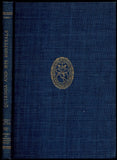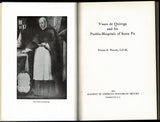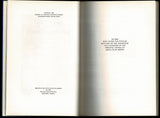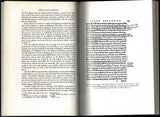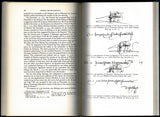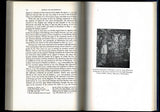Vasco De Quiroga and His Pueblo-Hospitals of Santa Fe
Author: Warren Benedict Fintan
Year: 1963
Publisher: Academy of American Franciscan History
Place: Washington, DC
Description:
x+133 pages with frontispiece, plates, bibliography and index. Quarto (10 1/4" x 6 3/4") bound in original publisher's blue cloth with gilt lettering to spine and insignia to cover. Academy of American Franciscan History Monograph Series Volume Seven. First edition.
Vasco de Quiroga (1470/78-1565), one of the truly great figures sent from Spain to New Spain in the sixteenth century, stands out for his contributions to the political ecclesiastical, and social development of Mexico. He was sent to the New World by the Spanish crown as a member of the Second Audiencia of Mexico in an effort to straighten out the confusion and turmoil which had resulted from ten years of struggling factionalism in the young colony and from the disastrous regime of Nuflo de Guzman and his companies of the First Audiencia.
In 1536 De Quiroga was appointed the first bishop of the newly established diocese of Michoacán. He was nominated by the President of the Second Audiencia, Bishop of Santo Domingo, Sebastián Ramírez Fuenleal, after the first candidate Fray Luis de Fuensalida had declined the honor. The Emperor and the Pope approved the nomination and in 1537 the appointment was made official; in 1538 he took office. He remained in Michoacán as pastor and protector of the Indians for most of the remainder of his life.
As bishop, he transferred the seat of the bishopric from Tzintzuntzán to Pátzcuaro. In Pátzcuaro he founded the cathedral and the Seminary of San Nicolas. He worked to gather the Indians in large towns near Lake Pátzcuaro in the center of Purépecha territory, recently ravaged by Beltrán de Guzmán. Using Thomas More's Utopia as a model, here the Indians were to be taught religion, crafts and the fundamentals of self-government. Each town was to become the center of an industry. Each person worked six hours a day and contributed on an equal basis to the common welfare. He gradually realized the necessity of restricting the scope of his plans, which he had hoped to apply throughout the colony, to the smaller area over which he had jurisdiction, partially because his personal funds were not unlimited.
Condition:
Very good to fine.







